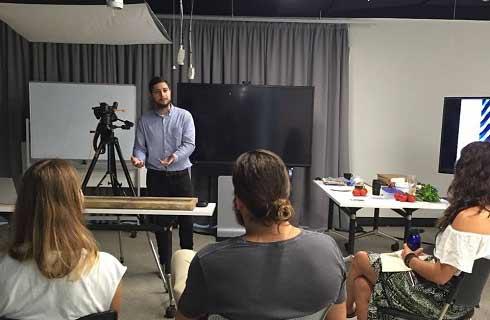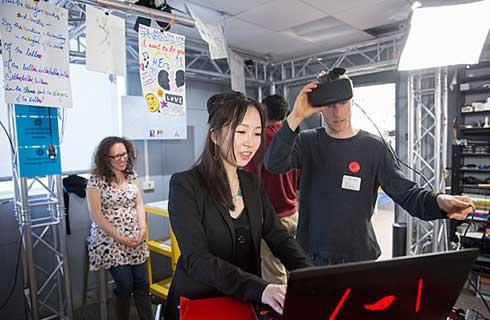MA/PGDip/PGCert Screenwriting

学历文凭
Masters Degree (Taught)

专业院系
Arts

开学时间

课程时长

课程学费

国际学生入学条件
You should usually hold a second-class honours degree (certain programmes may require a 2:1) from a recognised British or overseas university. Advice on recognition can be obtained from the Admissions Office. Non-graduates with appropriate professional qualifications will be considered on an individual basis by Programme Conveners, contact details can be found on the individual programme page. Applicants will be expected to apply and register for the full master's award. Those with a third-class honours degree are encouraged to complete an application as we will consider an applicant's wider circumstances in making a decision on an application.
IELTS Academic – 6.5 overall with a minimum 5.5 in each component.
Roehampton English Language Test- Mapped to IELTs scores, please refer to IELTS Academic above
TOEFL IBT - 89 overall with a minimum of 17 in Listening and Writing, 18 in Reading and 20 in Speaking
IDP—雅思考试联合主办方

雅思考试总分
6.5
- 雅思总分:6.5
- 托福网考总分:89
- 托福笔试总分:160
- 其他语言考试:Cambridge Proficiency Certificate - 176 overall with a minimum 162 in each component (some schools require a minimum of 169 in each)
CRICOS代码:
申请截止日期: 请与IDP联系 以获取详细信息。
课程简介
相关申请
 预科
预科 奖学金
奖学金 实习机会
实习机会 在校学习
在校学习 跨境学习
跨境学习 校园授课-线上开始
校园授课-线上开始 在线/远程学习
在线/远程学习
开学时间&学费
学费信息仅供参考,请与IDP联系以获取详细信息
| 开学时间 | 时长 | 学费 | 地点 |
|---|
关于罗汉普顿大学

罗汉普顿大学是一个历史悠久的现代学术团体,位于伦敦西南部,因高标准的教学和研究而国际声誉日盛。地理位置是罗汉普顿大学的一个关键资产。大学校园坐落在54英亩的景观公园内。这个有着178年历史的教育机构设施由林荫大道和开放绿地环绕,学生从伦敦市中心乘坐公共交通工具只需30分钟即可到达。传统大学校园的社区氛围,邻近世界最具活力城市之一,确实两全其美。大学校园拥有学生获得成功所需的所有设施,同时也提供了一个生活和工作的安全社交场所。历史建筑坐落在先进设施旁边。演讲厅和计算机实验室旁边是舞蹈和剧院场馆,还有体育设施,包括向所有学生开放的设备齐全的体育馆。大学提供广泛的室内和室外社交空间、餐饮、校内酒吧和各种无酒类饮品的场所。罗汉普顿大学学生会举办现场音乐活动、每周市场和俱乐部之夜,丰富了大学的社交活动。学生可申请一百多种各类本科和研究生学位课程,以及一些博士学习项目和研究职位。罗汉普顿大学在其所有院系的世界领先研究方面声誉卓著,教学人员非常熟悉各自的领域,在为学生提供专业知识方面拥有丰富的教学经验。罗汉普顿大学在研究方面的专长及其靠近伦敦的地理位置为学生在大学期间的见习和实习创造了大量机会,大学的赞助商网络和校友网络也为毕业生提供了进一步的支持。
本校相关课程

MA/PGDip Theology and Religious Studies
学历文凭
Masters Degree (Taught)
开学日期
课程费用总额


MPhil/PhD Psychology
学历文凭
Ph.D.
开学日期
课程费用总额


MPhil/PhD History and Classics
学历文凭
Ph.D.
开学日期
课程费用总额


MPhil/PhD Education
学历文凭
Ph.D.
开学日期
课程费用总额


MbyRes Ecology, Evolution and Behaviour
学历文凭
Masters Degree (Research)
开学日期
课程费用总额


MPhil/PhD Drama, Theatre and Performance
学历文凭
Ph.D.
开学日期
课程费用总额

其他相关课程

音乐和声音设计学士学位
 悉尼科技大学
悉尼科技大学学历文凭
Bachelor Degree
开学日期
课程费用总额


音乐学士(专业)
 中央昆士兰大学
中央昆士兰大学学历文凭
Bachelor Degree
开学日期
课程费用总额


戏剧学士(专业)
 中央昆士兰大学
中央昆士兰大学学历文凭
Bachelor Degree
开学日期
课程费用总额


工程学硕士(电子)
 阿德莱德大学
阿德莱德大学学历文凭
Masters Degree (Coursework)
开学日期
课程费用总额


音乐硕士(表演研究)
 阿德莱德大学
阿德莱德大学学历文凭
Masters Degree (Coursework)
开学日期
课程费用总额


音乐荣誉学士
 伊迪斯科文大学
伊迪斯科文大学学历文凭
Bachelor Degree with Honours
开学日期
课程费用总额










